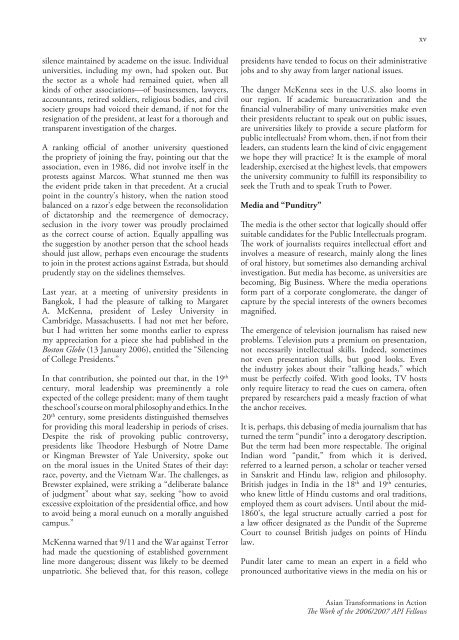Asian Transformations in Action - Api-fellowships.org
Asian Transformations in Action - Api-fellowships.org
Asian Transformations in Action - Api-fellowships.org
You also want an ePaper? Increase the reach of your titles
YUMPU automatically turns print PDFs into web optimized ePapers that Google loves.
xvsilence ma<strong>in</strong>ta<strong>in</strong>ed by academe on the issue. Individualuniversities, <strong>in</strong>clud<strong>in</strong>g my own, had spoken out. Butthe sector as a whole had rema<strong>in</strong>ed quiet, when allk<strong>in</strong>ds of other associations—of bus<strong>in</strong>essmen, lawyers,accountants, retired soldiers, religious bodies, and civilsociety groups had voiced their demand, if not for theresignation of the president, at least for a thorough andtransparent <strong>in</strong>vestigation of the charges.A rank<strong>in</strong>g official of another university questionedthe propriety of jo<strong>in</strong><strong>in</strong>g the fray, po<strong>in</strong>t<strong>in</strong>g out that theassociation, even <strong>in</strong> 1986, did not <strong>in</strong>volve itself <strong>in</strong> theprotests aga<strong>in</strong>st Marcos. What stunned me then wasthe evident pride taken <strong>in</strong> that precedent. At a crucialpo<strong>in</strong>t <strong>in</strong> the country’s history, when the nation stoodbalanced on a razor’s edge between the reconsolidationof dictatorship and the reemergence of democracy,seclusion <strong>in</strong> the ivory tower was proudly proclaimedas the correct course of action. Equally appall<strong>in</strong>g wasthe suggestion by another person that the school headsshould just allow, perhaps even encourage the studentsto jo<strong>in</strong> <strong>in</strong> the protest actions aga<strong>in</strong>st Estrada, but shouldprudently stay on the sidel<strong>in</strong>es themselves.Last year, at a meet<strong>in</strong>g of university presidents <strong>in</strong>Bangkok, I had the pleasure of talk<strong>in</strong>g to MargaretA. McKenna, president of Lesley University <strong>in</strong>Cambridge, Massachusetts. I had not met her before,but I had written her some months earlier to expressmy appreciation for a piece she had published <strong>in</strong> theBoston Globe (13 January 2006), entitled the “Silenc<strong>in</strong>gof College Presidents.”In that contribution, she po<strong>in</strong>ted out that, <strong>in</strong> the 19 thcentury, moral leadership was preem<strong>in</strong>ently a roleexpected of the college president; many of them taughtthe school’s course on moral philosophy and ethics. In the20 th century, some presidents dist<strong>in</strong>guished themselvesfor provid<strong>in</strong>g this moral leadership <strong>in</strong> periods of crises.Despite the risk of provok<strong>in</strong>g public controversy,presidents like Theodore Hesburgh of Notre Dameor K<strong>in</strong>gman Brewster of Yale University, spoke outon the moral issues <strong>in</strong> the United States of their day:race, poverty, and the Vietnam War. The challenges, asBrewster expla<strong>in</strong>ed, were strik<strong>in</strong>g a “deliberate balanceof judgment” about what say, seek<strong>in</strong>g “how to avoidexcessive exploitation of the presidential office, and howto avoid be<strong>in</strong>g a moral eunuch on a morally anguishedcampus.”McKenna warned that 9/11 and the War aga<strong>in</strong>st Terrorhad made the question<strong>in</strong>g of established governmentl<strong>in</strong>e more dangerous; dissent was likely to be deemedunpatriotic. She believed that, for this reason, collegepresidents have tended to focus on their adm<strong>in</strong>istrativejobs and to shy away from larger national issues.The danger McKenna sees <strong>in</strong> the U.S. also looms <strong>in</strong>our region. If academic bureaucratization and thef<strong>in</strong>ancial vulnerability of many universities make eventheir presidents reluctant to speak out on public issues,are universities likely to provide a secure platform forpublic <strong>in</strong>tellectuals? From whom, then, if not from theirleaders, can students learn the k<strong>in</strong>d of civic engagementwe hope they will practice? It is the example of moralleadership, exercised at the highest levels, that empowersthe university community to fulfill its responsibility toseek the Truth and to speak Truth to Power.Media and “Punditry”The media is the other sector that logically should offersuitable candidates for the Public Intellectuals program.The work of journalists requires <strong>in</strong>tellectual effort and<strong>in</strong>volves a measure of research, ma<strong>in</strong>ly along the l<strong>in</strong>esof oral history, but sometimes also demand<strong>in</strong>g archival<strong>in</strong>vestigation. But media has become, as universities arebecom<strong>in</strong>g, Big Bus<strong>in</strong>ess. Where the media operationsform part of a corporate conglomerate, the danger ofcapture by the special <strong>in</strong>terests of the owners becomesmagnified.The emergence of television journalism has raised newproblems. Television puts a premium on presentation,not necessarily <strong>in</strong>tellectual skills. Indeed, sometimesnot even presentation skills, but good looks. Eventhe <strong>in</strong>dustry jokes about their “talk<strong>in</strong>g heads,” whichmust be perfectly coifed. With good looks, TV hostsonly require literacy to read the cues on camera, oftenprepared by researchers paid a measly fraction of whatthe anchor receives.It is, perhaps, this debas<strong>in</strong>g of media journalism that hasturned the term “pundit” <strong>in</strong>to a derogatory description.But the term had been more respectable. The orig<strong>in</strong>alIndian word “pandit,” from which it is derived,referred to a learned person, a scholar or teacher versed<strong>in</strong> Sanskrit and H<strong>in</strong>du law, religion and philosophy.British judges <strong>in</strong> India <strong>in</strong> the 18 th and 19 th centuries,who knew little of H<strong>in</strong>du customs and oral traditions,employed them as court advisers. Until about the mid-1860’s, the legal structure actually carried a post fora law officer designated as the Pundit of the SupremeCourt to counsel British judges on po<strong>in</strong>ts of H<strong>in</strong>dulaw.Pundit later came to mean an expert <strong>in</strong> a field whopronounced authoritative views <strong>in</strong> the media on his or<strong>Asian</strong> <strong>Transformations</strong> <strong>in</strong> <strong>Action</strong>The Work of the 2006/2007 API Fellows
















